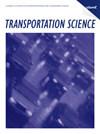沃德洛普均衡可以是有界理性的:路线选择的新行为理论
IF 4.8
2区 工程技术
Q1 OPERATIONS RESEARCH & MANAGEMENT SCIENCE
引用次数: 0
摘要
作为交通科学中最基本的概念之一,沃德普平衡(Wardrop equilibrium,WE)的行为基础一直相对薄弱。为了加强这一基础,我们必须考虑到人类决策过程中的有限理性,如缺乏准确信息、计算能力有限以及次优选择等。然而,文献中对行为完美主义的退却通常伴随着对 WE 概念的修改。在这里,我们表明,放弃完美理性并不一定要背离 WE。相反,在有界理性旅行者的路线博弈中,WE 可以达到全局稳定。我们通过建立一个日复一日(DTD)的动态模型来实现这一结果,该模型模仿了旅行者如何根据过去的经验逐步调整他们的路线估值,从而调整选择概率。我们的模型被称为累积 logit(CumLog),它与经典的 DTD 模型相似,但有一个关键的变化;经典模型假定路线的估值是基于历史数据的平均成本,而我们的模型则是基于累积的成本。为了描述路线选择行为,CumLog 模型只使用了两个参数,一个是未来路线成本相对于过去路线成本的估值贴现率,另一个是路线选择概率对估值差异的敏感度。我们证明,只要行为参数满足某些温和条件,无论初始点如何,CumLog 模型总是收敛于 WE。因此,我们的理论维护了 WE 在交通系统分析中的基准地位。它还解释了为什么在平衡状态下,同样好的路线可能会以不同的概率被选择,这就解决了哈桑尼提出的不稳定性问题:本研究由美国国家科学基金会资助[Grants CMMI #2225087 and ECCS #2048075]:在线附录见 https://doi.org/10.1287/trsc.2023.0132 。本文章由计算机程序翻译,如有差异,请以英文原文为准。
Wardrop Equilibrium Can Be Boundedly Rational: A New Behavioral Theory of Route Choice
As one of the most fundamental concepts in transportation science, Wardrop equilibrium (WE) has always had a relatively weak behavioral underpinning. To strengthen this foundation, one must reckon with bounded rationality in human decision-making processes, such as the lack of accurate information, limited computing power, and suboptimal choices. This retreat from behavioral perfectionism in the literature, however, was typically accompanied by a conceptual modification of WE. Here, we show that giving up perfect rationality need not force a departure from WE. On the contrary, WE can be reached with global stability in a routing game played by boundedly rational travelers. We achieve this result by developing a day-to-day (DTD) dynamical model that mimics how travelers gradually adjust their route valuations, hence choice probabilities, based on past experiences. Our model, called cumulative logit (CumLog), resembles the classical DTD models but makes a crucial change; whereas the classical models assume that routes are valued based on the cost averaged over historical data, our model values the routes based on the cost accumulated. To describe route choice behaviors, the CumLog model only uses two parameters, one accounting for the rate at which the future route cost is discounted in the valuation relative to the past ones and the other describing the sensitivity of route choice probabilities to valuation differences. We prove that the CumLog model always converges to WE, regardless of the initial point, as long as the behavioral parameters satisfy certain mild conditions. Our theory thus upholds WE’s role as a benchmark in transportation systems analysis. It also explains why equally good routes at equilibrium may be selected with different probabilities, which solves the instability problem posed by Harsanyi.Funding: This research is funded by the National Science Foundation [Grants CMMI #2225087 and ECCS #2048075].Supplemental Material: The online appendix is available at https://doi.org/10.1287/trsc.2023.0132 .
求助全文
通过发布文献求助,成功后即可免费获取论文全文。
去求助
来源期刊

Transportation Science
工程技术-运筹学与管理科学
CiteScore
8.30
自引率
10.90%
发文量
111
审稿时长
12 months
期刊介绍:
Transportation Science, published quarterly by INFORMS, is the flagship journal of the Transportation Science and Logistics Society of INFORMS. As the foremost scientific journal in the cross-disciplinary operational research field of transportation analysis, Transportation Science publishes high-quality original contributions and surveys on phenomena associated with all modes of transportation, present and prospective, including mainly all levels of planning, design, economic, operational, and social aspects. Transportation Science focuses primarily on fundamental theories, coupled with observational and experimental studies of transportation and logistics phenomena and processes, mathematical models, advanced methodologies and novel applications in transportation and logistics systems analysis, planning and design. The journal covers a broad range of topics that include vehicular and human traffic flow theories, models and their application to traffic operations and management, strategic, tactical, and operational planning of transportation and logistics systems; performance analysis methods and system design and optimization; theories and analysis methods for network and spatial activity interaction, equilibrium and dynamics; economics of transportation system supply and evaluation; methodologies for analysis of transportation user behavior and the demand for transportation and logistics services.
Transportation Science is international in scope, with editors from nations around the globe. The editorial board reflects the diverse interdisciplinary interests of the transportation science and logistics community, with members that hold primary affiliations in engineering (civil, industrial, and aeronautical), physics, economics, applied mathematics, and business.
 求助内容:
求助内容: 应助结果提醒方式:
应助结果提醒方式:


